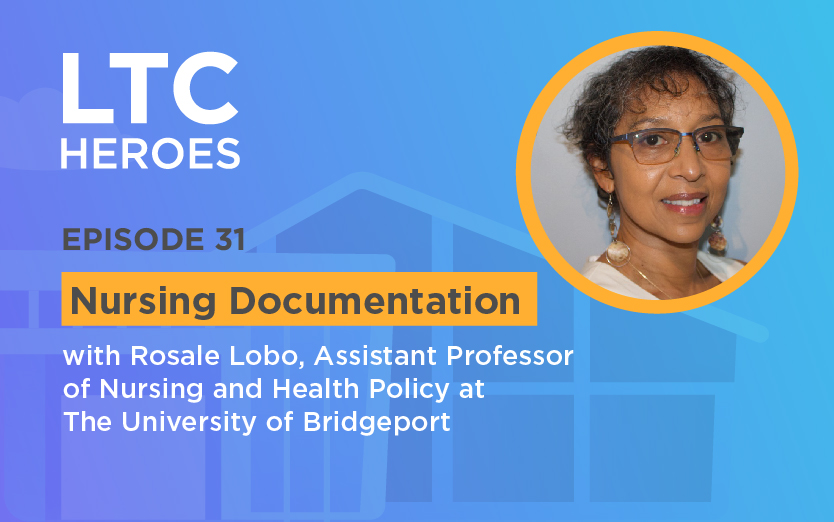In this episode of the LTC Heroes podcast, Rosale Lobo, Assistant Professor of Nursing and Health Policy, sits down with us to discuss her approach to nurse training and the importance of nursing documentation.
Nurse Training
Rosale shares that when training new nurses, she first teaches them about empathizing and understanding people. Without this foundation of interpersonal skills and an ability to see nuances about a patient, other nursing duties such as documentation become much more difficult.
Without a big picture view of your patients and knowing what qualitative data to capture, she says, nurses will struggle to understand how their documentation contributes to the overall care of their patients.
Nursing Documentation
Rosale highlights some key challenges around documentation, including that EHRs are rarely aligned with the workflow of nurses, nurses don’t have enough input in the design of EHRs, and EHRs often don’t reflect the human element of nursing.
When it comes to poor documentation habits, Rosale cites a lack of details and vague language as the main offenders. Without precision when nurses are charting, it’s difficult to truly gain the big picture around a patient. This can also lead to issues in concerns with litigation and regulation.
Learn more and sign up to be notified about future episodes at LTCHeroes.com
Rapid Fire Q/A
What’s the most recent non-LTC book you’ve read?
“Never Split the Difference” by Chris Voss. I’m just learning how to negotiate, how to look at people for who they are, and read people a little bit better. Make sure you understand what they need and want before you try to impart what you’re looking to get out of the deal. So it’s a human experience about negotiation.
Who is Rosale Lobo outside of your job as a professor and consultant?
I have three sons who are 28, 21, and 20, who I love dearly. I have a husband of almost 30 years, and a mom who is 91. I’m an avid exercise fanatic and I try to eat right. And I love the topic of nursing documentation. I love teaching nurses about health policy. I really love for healthcare professionals to understand how the laws of healthcare can change the way we think.
What’s the biggest change you’ve seen in the LTC industry during your career?
That change is a trickle-down effect from just healthcare in general. The patients that are in the acute care setting are traumatically ill, the comorbidities are just very sad. And I feel the stress of the nurses that have to take care of those patients who are really ill compared to the way they looked 10 or 15 years ago. So what I see is that the acuity level of the patients in long-term care, some of them are not very stable. They’re still very acute.
What’s the best advice you’ve received?
To follow the rules always, even if you think no one is looking.
Who is one of your mentors?
As a nurse for a really long time, I truly believe that so many skills that we have outside of nursing, we bring into nursing because we have to be so many types of people when we’re taking care of patients. So I’m going to say that one of the biggest mentors that I have is my husband. He has been a leader and administrator for many years, and he has such a very cool way of managing people and allowing people to be who they are, and at the same time, fulfilling the mission and visions of the organizations that he works for.


Really informative post. Personally, I found this written article to be a good fit for me, and it was easy for me to follow the given guidelines.
Please also visit my blog!!